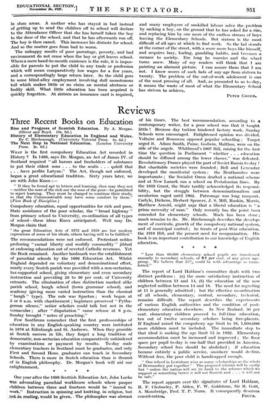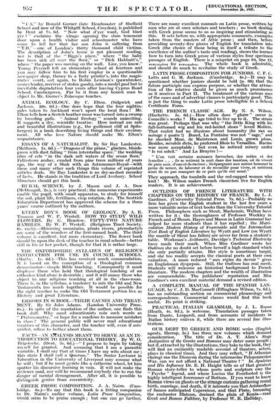" Less than 60,000 elementary school pupils are transferred annually
to secondary schools, or 9-1 per cent. of any given age- group. We believe that 25% could be with advantage so trans- ferred."
The report of Lord Haldane's committee deals with two distinct problems : (a) the more satisfactory instruction of children between 11 and 14, (b) the education of the now neglected million between 14 and 16. The -need for regrading
at 11 is generally admitted ; but the effective co-ordination of all schools, elementary, central, seCondary, technical,
remains difficult. The report describes the experiments of various English authorities and the condition of post- elementary education elsewhere. In New Zealand, 50 per cent. elementary children proceed to full-time education, ten out of twelve secondary scholars being free-placers. If England raised- the compulsory age limit to 16, 1,000,000 more children must be included. The immediate step to that ideal is making the age limit 15 in 1932. Elementary accommodation must be increased and improved ; the floor space per pupil to-day is onr-half that provided in America. .Secondary school fees should be abolished ; if education became entirely a public service, snobbery would decline. Without fees, the poor child is handicapped enough.
" One school in Lewisham wins as many scholarships as the whole of Bermondsey put together." The proposed reforms will be costly but " unless the nation will set its hand to the reforms which we support or something better it will not flourish and . . . it will not be safe."
The report appears over the signatures of Lord Haldane, R. F: Cholmeley, P. Alden, F. W. Goldstone, Sir B. Gott, A. Mansbridge, Prof. T. P. Nunn. It consequently deserves " C 3," by Ronald Gurner (late Headmaster of Sheffield School and now of the Whitgift School,,Croydon), is published by Dent at 7s. 6d. " Now what d'yer want, God blast yer ? " exclaims the virago opening the slum tenement door upon a health visitor and schoolmaster who have come to tell her that her son John is suffering from T.B."—one of London's thirty thousand child victims. The description of John's borne is not pleasant reading, nor is that of the " Biggs's place," where " the baby has been sick all over the floor," or " Dick Habbutt's," where " the paper was moving on the wall. Lice, you know." Young Peverell left an elementary school at fourteen and you may follow him to his first employ in a questionable newspaper shop, thence to a fusty printer's, into the magis- trates' court, out again, to Robin Lewison's (pawnbroker, moneylender, receiver of stolen goods), into a model gaol but to inevitable degradation four years after leaving Cyprus Road School, Cambergreen. Far be it from any honest man to object to Mr. turner's Zolaesque touches.























































 Previous page
Previous page